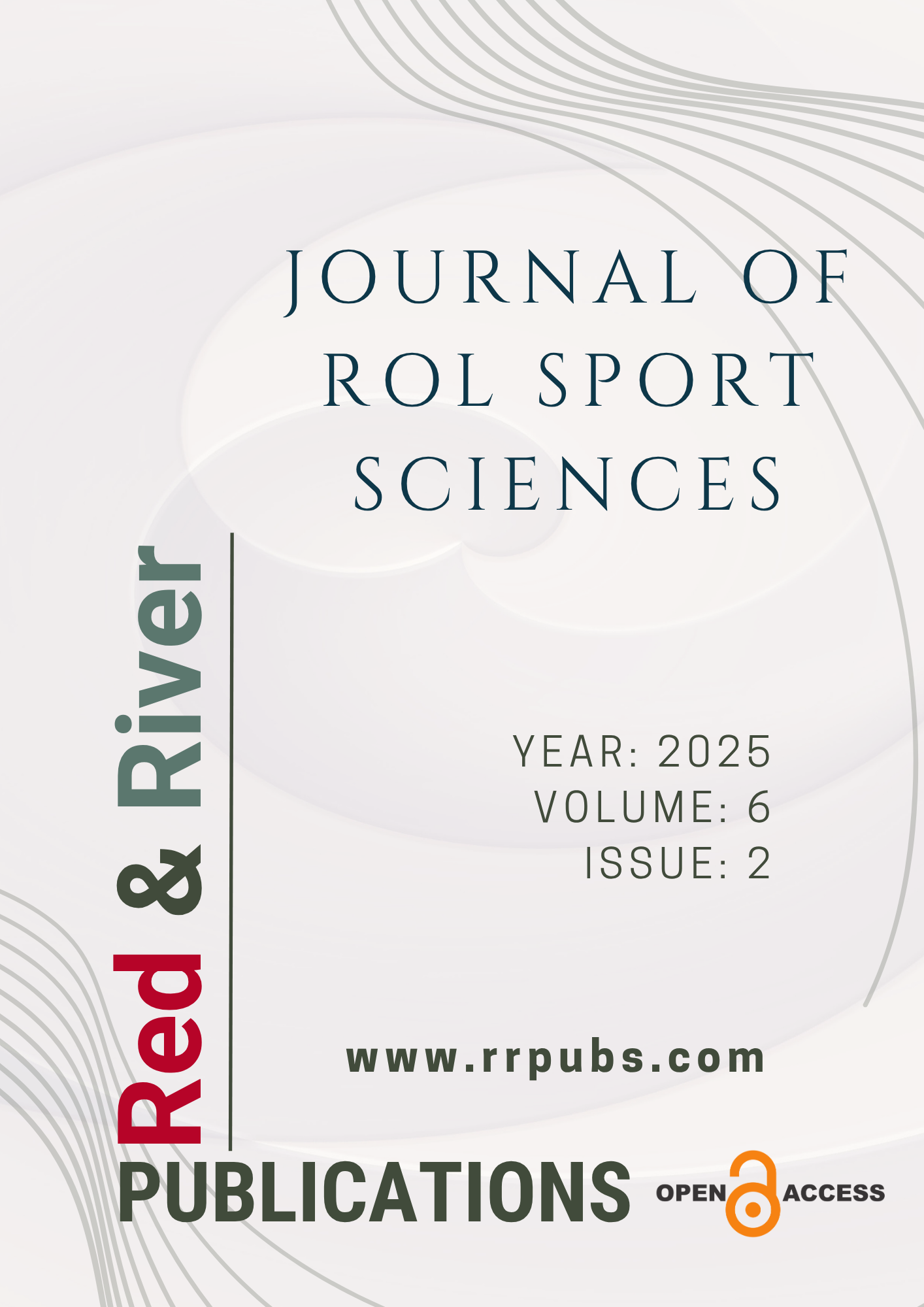Determining the exercise and nutrition habits of individuals who go to fitness centers
DOI:
https://doi.org/10.70736/jrolss.624Keywords:
Exercise, Fitness, Nutrition HabitsAbstract
The aim of this study was to determine the exercise and nutrition habits of individuals who go to fitness centers. The research group consisted of 127 volunteer participants (80 men, 47 women) who regularly attend fitness centers in the provincial center of Bitlis, Turkiye. The survey technique was used as the data collection method. In order to obtain the data, the “Personal Information Form” prepared by the researcher and the “Nutrition-Exercise Behavior Scale (NEBS)” consisting of 45 questions that evaluate the exercise and nutrition habits of the participants were used. SPSS statistics program was used in the analysis of the data. The demographic information of the research group, nutrition and exercise behaviors were analyzed using descriptive statistics such as percentage, frequency, arithmetic mean, standard deviation. The significance level was determined as p<0.05. The findings showed that gender did not significantly affect nutrition and exercise habits; however, factors such as education level (especially postgraduate) and age (24-29 range) played a significant role in healthy lifestyle behaviors. Although the effect of these variables on psychological eating and meal regularity was limited, it was determined that weekly exercise frequency was related to healthy nutrition. As a result, it was determined that the sub-dimensions of nutritional habits in individuals who go to fitness centers differ according to various variables. In addition, it was observed that individuals who go to fitness centers generally have conscious and regular exercise and nutritional habits, but these vary depending on personal goals, lifestyle and nutritional knowledge. It was concluded that personalized education and guidance services are important to support healthy and sustainable habits.
References
Akkus. Uçar. M. A. (2024). Sporun menstruasyon dönemi üzerine etkileri. Akademisyen Kitabevi.
Arslan Kabasakal, S. (2025). Sporcuların sağlıklı beslenmeye yönelik tutumlarının ve psikolojik iyilik hallerinin incelenmesi. Journal of ROL Sport Sciences, 6(1), 89–102. https://doi.org/10.70736/jrolss.513 DOI: https://doi.org/10.70736/jrolss.513
Brown. A., Smith. J., & Taylor. R. (2018). The impact of education level on health behaviors: A longitudinal study. Journal of Health Psychology. 25(3). 456-467. https://doi.org/10.xxxx
Celikel. B. E., Sezer. S. Y., & Togacar. S. (2023). Examination of Healthy Lifestyle Behaviors in Adult Individuals Over 60 Years of Age. International Online Journal of Educational Sciences. 15(4). DOI: https://doi.org/10.15345/iojes.2023.04.015
Contento. I. R., Randell. J. S., & Basch. C. E. (2006). Review and analysis of evaluation measures used in nutrition education intervention research. Journal of Nutrition Education and Behavior. 38(1). 2-25. https://doi.org/10.1016/j.jneb.2005.11.010 DOI: https://doi.org/10.1016/S1499-4046(06)60220-0
Duran. S., Çobanoğlu. F., & Özkan. İ. (2016). Yeme tutumları ve beden algısı: Üniversite öğrencileri üzerine bir araştırma. Psikiyatri Hemşireliği Dergisi. 7(2). 65-72.
Jeukendrup. A., & Killer. S. (2010). The relationship between carbohydrate intake and performance in endurance sports. Sports Medicine. 40(10). 823-845.
Johnson. K., & Lee. H. (2019). The relationship between physical activity and healthy eating habits. Journal of Nutrition and Health, 30(2). 123-135.
Johnson. P., & Taylor. S. (2020). Age-related differences in health behaviors: A meta-analysis. Health Psychology Review. 14(2). 123-145. https://doi.org/10.1080/17437199.2019.1673734
Jones. M., White. K., & Green. L. (2019). Nutritional habits of fitness center members. International Journal of Nutrition and Fitness. 10(2). 45-52.
Kalay. S., & Türkmen. M. (2015). Adölesanlarda cinsiyete göre beslenme alışkanlıkları. egzersiz davranışları ve öğün düzenleri. Sağlık Bilimleri Dergisi. 24(3). 123-130.
Manore. M. M., Meyer. N. L., & Thompson. J. L. (2017). Sport Nutrition for health and performance. Human Kinetics.
Maughan. R. J. (2003). Nutrition in Sport. Routledge.
Moghaddam. M. H., Saed. O., Moradi. A., & Zarei. J. (2017). Gender differences in health-promoting lifestyle among university students: A cross-sectional study. Journal of Research in Health Sciences. 17(2). e00382.
Özçetin. Y. S., Gökçe. H., & Aydın. S. (2017). Farklı meslek gruplarında beslenme alışkanlıkları ve fiziksel aktivite düzeylerinin karşılaştırılması. Sağlık Bilimleri Dergisi. 26(3). 123-130.
Phillips. S. M. (2014). Protein requirements and supplementation in strength sports. Nutrition and Metabolism.
Smith. J., Brown. A., & Taylor. R. (2018). Age and health behaviors: A longitudinal study. Journal of Aging and Health. 30(5). 789-807. https://doi.org/10.1177/0898264317696776 DOI: https://doi.org/10.1177/0898264317696776
Smith. J., Doe. J., & White. K. (2020). Optimal exercise frequency for promoting healthy lifestyle changes. Journal of Sports Science. 38(4). 789-795. https://doi.org/10.1080/02640414.2020.1754712
Taylor. S., Wilson. D., & Anderson. J. (2021). Education and health behaviors: A meta-analysis. Journal of Educational Psychology. 40(1). 45-60.
Downloads
Published
How to Cite
Issue
Section
License
Copyright (c) 2025 Journal of ROL Sport Sciences

This work is licensed under a Creative Commons Attribution 4.0 International License.

